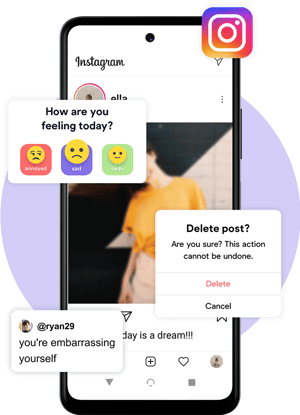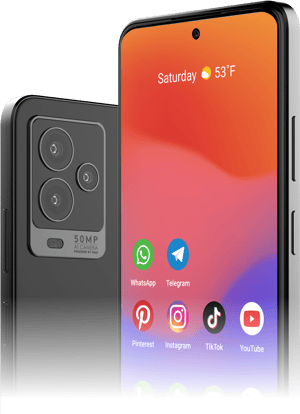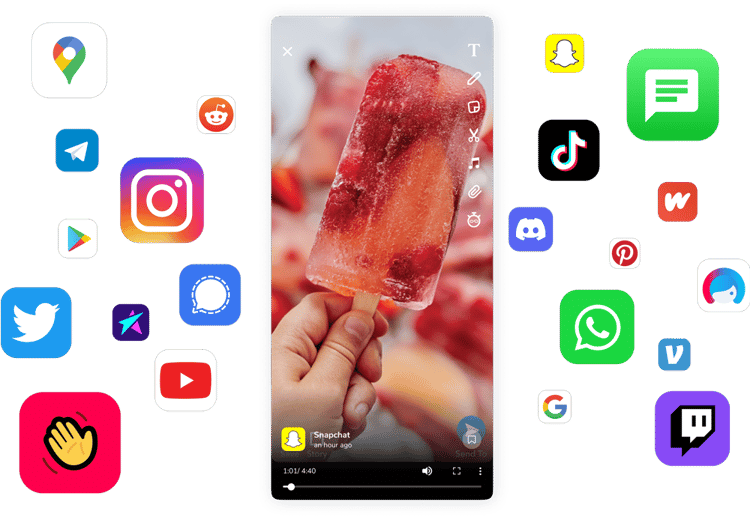As a parent, how many times have you been told that your kid is spending too much time online? Or that more than two hours in front of their phone is excessive screen time that’s guaranteed to negatively affect their mental health?
My guess is you’ve heard it a lot and have been convinced that screen time limits are your best option.
At the end of the day, your decision to limit screen time is completely up to you and what you think is best for your kids. But, before you decide, think about this…
What if screen time isn’t the villain?
We know, that might sound crazy but the research is there. Recent studies have been conducted on kids to test if excessive screen time links to a decrease in mental health.
Little evidence was found that directly correlated to how much time spent in front of a screen impacted a kid’s overall well-being.
More and more pediatricians believe that it’s not about the amount of screen time and more about the type of online experiences kids are having.
So in short, screen time isn’t the real problem.
Let’s think about it this way.
What problems do screen time limits really fix?
Of course, smartphones make it extremely easy for us to track our kid’s screen time and set limits on specific apps and social media platforms. This encourages them to take a step away from their phone but it doesn’t mean they leave the emotional impact of what they saw online behind.
Consider these two situations that could happen to your kid.
1) They sign in to their Instagram account and see three new comments on their latest post. The first comment says “It’s not too late to delete this”, the second says “This trend is so last week”, and the third says “You’re embarrassing yourself”. Within seconds they’ve become a victim of cyberbullying. They delete the post and spend the rest of the day worrying about what others think of them, nervous to go to school the next day.

OR
2) They jump on TikTok and spend over an hour scrolling through their For You Page. This curated feed is filled with videos about baseball, magic tricks, ways to be eco-friendly, yummy dessert recipes, and creatively edited videos. After following a few new accounts and liking some videos, they put their phone down with a smile on their face, and go downstairs for dinner.

Was the amount of screen time the issue? Of course not.
It’s what happened during the time that affected their mood.
The argument to set limits is usually to protect your child from these situations, but would it have changed anything? The reality is, negative experiences can happen anywhere, at any time, and screen time isn’t the answer.
Restricting your kid’s screen time and online access could even lead to sneaky and defiant behavior, which undermines the overall goal of strengthening your relationship. This is where your involvement can make all the difference.
Introducing Online Freedom...
Don’t get rid of social media. Teach through it! Allowing your kid the freedom to explore with your active involvement ultimately results in the development of long-term, healthy digital habits for children.
They need a parent’s guidance to teach them how to:
- Post and interact in a way that represents them in a positive light
- Recognize what content leaves them feeling confident and inspired
- Establish social media expectations
- Handle certain online situations
The goal is that, over time, they’ll learn how their online actions affect themselves and others. Rather than attempting to shield them from negative content and weakening that trust, you can leverage their time spent online as a tool to become closer and strengthen your relationship.
So, how can I become involved in my child’s online life?
If you’re asking this question, you’re one step ahead.
Restrictions and screen time limits are unreliable solutions to monitoring your kid’s online activity and can leave you with a blind spot that affects your relationship with them.
So, what do you do?
Say Hello to Aqua One

With more and more kids spending time in front of their digital devices, it’s more evident than ever that parents need to get involved in this aspect of their life.
But, there hasn’t been a way until now.
Instead of encouraging restrictions and limited screen time, we created the Aqua One, a fully functional smartphone with unlimited parental monitoring capabilities. Cyber Dive’s platform is a powerful parenting tool by bridging the gap between what you think your kid is doing online versus what they’re actually doing.
How does it work?
Our web application gives you access to every detail of their online activity in your Cyber Dive Parent Dashboard. Every time your kid downloads a new app or watches a TikTok or even makes a Google search, you’ll be right there.
Your Parent Dashboard unlocks their online world in a way parental controls never can…

How can Aqua One be used as a parenting tool?
Let’s be real. It is likely that, at some point, your kid will come across online content that makes them feel uncomfortable or brings up questions they didn’t have before.
When this happens, your involvement will allow you to know when it is time to initiate tough conversations about topics like mental health, exploring one’s sexuality, bullying, or self-esteem. You have the opportunity to step in and be a resource and support system for your kid when they need it.
With this insight, you can make a more informed decision as to whether or not limiting screen time is the most effective way to improve your kid’s online experiences or if monitoring will benefit their habits long-term!
Ready to get started? Secure the revolutionary Aqua-One.

